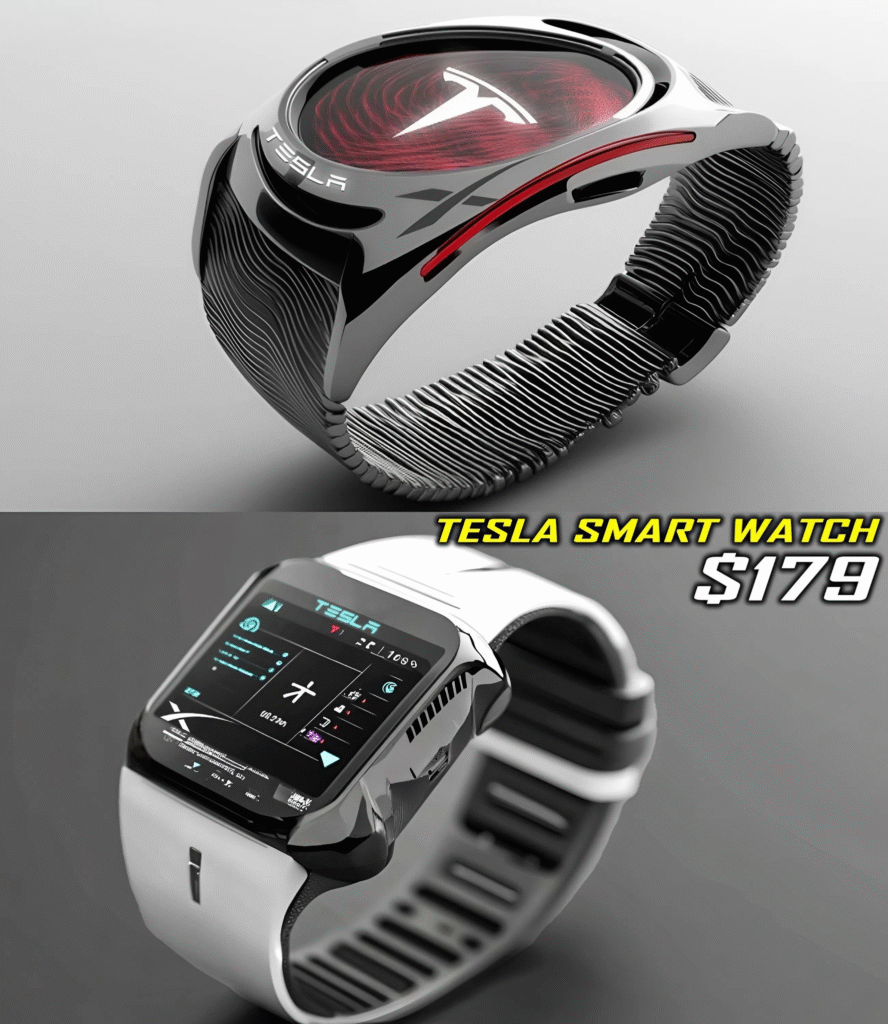
When Elon Musk announces a new product, the world stops and listens. From electric cars that shattered the auto industry, to flamethrowers and Tesla-branded tequila bottles that made headlines for their absurdity, Musk has built his empire on the unexpected. Now, with the unveiling of the Tesla Smart Watch — a $179 wearable device that Musk claims could render smartphones obsolete — Tesla has once again pushed into uncharted territory.
This isn’t just about a new gadget. This is about a potential end of Apple’s dominance in personal technology. For years, the iPhone has been the central device in billions of people’s lives. But Musk believes that era is over, and his new watch may be the catalyst for change.

More Than a Watch
At first glance, the Tesla Smart Watch looks sleek, minimalist, and futuristic — everything you’d expect from a company that designed the angular Cybertruck. But beneath its surface lies an ecosystem of features that could reshape how we connect with each other, manage our health, and even combat one of the greatest silent epidemics of our time: loneliness.
Musk claims this device doesn’t just track your steps or monitor your sleep. It’s designed to act like a companion, analyzing emotional signals through biometric sensors and offering AI-driven responses to keep you mentally balanced. Imagine a device that can not only measure your heart rate but also recognize when your stress is rising during a difficult day — and talk you through it in real time.
For seniors and adults living alone, this feature alone could be transformative. Studies show that loneliness affects nearly 30 percent of adults in America, and for elderly people, the health risks of social isolation are often compared to smoking 15 cigarettes a day. Musk insists that the Tesla Watch was engineered with this crisis in mind.
A Phone Killer?
Perhaps the boldest claim surrounding the Tesla Smart Watch is that it could eventually replace your phone entirely. In Musk’s vision, the watch isn’t just a companion; it’s a hub of information. Equipped with a miniaturized version of Starlink connectivity, the watch is rumored to provide seamless global internet access without needing a separate SIM card or carrier plan.
The idea is simple yet revolutionary: instead of pulling a phone from your pocket, you’d use the Tesla Watch as your universal interface — projecting holographic displays, enabling instant translation in conversations, and providing real-time access to “all the world’s information” from your wrist. Musk described it as having “the power of a supercomputer smaller than a deck of cards, but accessible anywhere, by anyone.”
If this becomes reality, Apple’s iPhone dominance could be in serious danger.
The $0 Strategy That Shocked Analysts
But perhaps the most shocking revelation isn’t the features of the Tesla Smart Watch — it’s the pricing strategy. Musk announced that while the device would retail for $179, Tesla plans to eventually make it available for $0 through what he calls an “unprecedented adoption model.”
The details are scarce, but insiders suggest Tesla may subsidize the cost through Starlink subscription packages or partnerships with Tesla vehicles. Imagine buying a Tesla car or subscribing to Tesla’s satellite internet service and receiving a smartwatch — free of charge — as part of the ecosystem. Analysts say such a move would not only disrupt Apple and Samsung but could trigger a seismic shift in the entire tech industry.

Beyond Cars, Beyond Gadgets
Skeptics once laughed when Tesla released tequila bottles, short shorts, and Cybertruck whistles. But Musk has always insisted that these were “fun distractions” on the way to bigger ambitions. With the Tesla Watch, the message is clear: Tesla is not just a car company anymore. It’s an ecosystem builder, a company looking to integrate every aspect of daily life into a single web of innovation.
Musk himself framed the product as part of Tesla’s mission to “improve human life, both physically and emotionally.” Whether through clean energy, advanced transport, or now, wearable technology, Musk seems intent on transforming industries one after another.
The Beginning of the End for Apple?
Apple’s dominance in wearables, through the Apple Watch, cannot be underestimated. Yet Tesla’s entry into the space comes at a time when consumer expectations are shifting. People want devices that don’t just track fitness — they want meaningful connections, mental health support, and independence from legacy phone systems.
If Tesla can deliver even half of what it promises — a device that ends loneliness, saves lives, and potentially replaces phones — Apple may soon find itself facing the same disruption it once delivered to Nokia and BlackBerry.
The Future on Your Wrist
The Tesla Smart Watch is more than just another wearable. It represents a challenge to the status quo of personal technology, a gamble that humanity is ready to move beyond smartphones, and a promise that technology can address not just productivity but also the human need for connection.
Whether you see Musk as a visionary or a showman, one thing is undeniable: with the Tesla Watch, he has once again shocked the world. And if his boldest claims hold true, we may soon look back on this moment as the beginning of the end of Apple’s reign — and the dawn of a new era in wearable technology.





